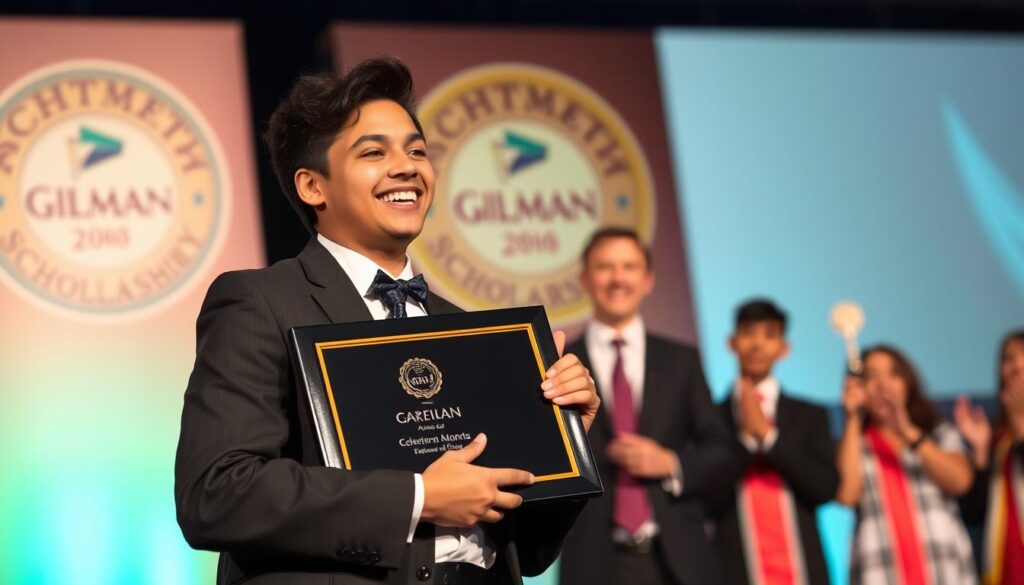Looking for undergraduate scholarships to study abroad? Check our listicle for the top 5 scholarships for Bachelor’s Students. Studying abroad can be a life-changing experience, but it often comes with a hefty price tag. There are many types of Scholarships for Bachelor’s degree offered the universities in abroad. Fortunately, numerous scholarship opportunities are available to help make international education more accessible to students pursuing a bachelor’s degree.
These prestigious programs not only provide financial aid but also enhance academic credentials and career prospects. By exploring the top scholarship programs, students can significantly reduce the financial burden associated with studying overseas.
Understanding these opportunities is crucial for students seeking to gain international experience without accumulating excessive debt. The right scholarship can cover expenses such as tuition, travel, housing, and living costs abroad, making international education more achievable.
Key Takeaways
- Top scholarship programs for bachelor’s students studying abroad.
- Eligibility criteria and application processes for these scholarships.
- Award amounts and the financial impact on studying abroad.
- Merit-based and need-based scholarship opportunities.
- How these scholarships can enhance academic and career prospects.
- Tips for successfully applying for these competitive scholarships.
Understanding the Value of Studying Abroad
Pursuing a degree abroad can be a life-changing experience for students. It offers a unique blend of academic, personal, and professional growth opportunities that can significantly enhance their future prospects.
Academic and Personal Growth Benefits
Studying abroad fosters academic growth by exposing students to different teaching methodologies and curricula, broadening their academic horizons. It also promotes personal growth by encouraging independence, resilience, and cross-cultural understanding. Many programs offer a diverse range of courses that cater to various interests and academic pursuits.
Career Advantages of International Experience
The career advantages of studying abroad are numerous. Employers increasingly value international experience, recognizing that students who study abroad develop valuable skills such as cross-cultural communication, adaptability, and problem-solving. Some key benefits include:
- Enhanced employability due to the development of highly sought-after skills.
- Access to valuable professional networks that span multiple countries.
- Increased opportunities for international collaboration and career advancement.
- Higher starting salaries compared to peers without international experience.

By studying abroad, students can gain a competitive edge in the global job market, opening up new opportunities for their future careers.
The Rising Cost of International Education
The rising costs of international education are transforming the landscape of global learning, impacting students worldwide. As more students aspire to study abroad, the financial burden becomes a significant concern.
Tuition Trends for International Students
Tuition fees for international students have been steadily increasing, making it challenging for many to afford. The cost varies significantly depending on the country and institution, with some programs being more expensive than others. For instance, universities in the United States, the United Kingdom, and Australia are popular destinations but come with higher tuition fees.
Additional Expenses Beyond Tuition for these top 5 Scholarships
Besides tuition, international students face numerous other expenses. Some of these include:
- Visa application fees ranging from $160 to $500, depending on the destination country.
- Mandatory health insurance, which can cost between $1,000 and $2,500 annually.
- Housing costs, which can consume 40-60% of a student’s total budget in cities like London, Sydney, and Boston.
- International travel expenses, including flights home during academic breaks, adding $1,500 to $5,000 to the annual budget.
- Currency exchange fees and international banking costs, creating hidden expenses.
- Textbooks and course materials, which can be 20-30% more expensive than at domestic schools.

Understanding these costs is crucial for students to plan their finances effectively and explore available funds and scholarships to support their education abroad.
Why Undergraduate Scholarships Are Essential
Undergraduate scholarships play a crucial role in making international education accessible to students worldwide. These financial aids are not just beneficial; they are essential for students who aspire to study abroad but are hindered by financial constraints.
Reducing Student Debt Burden
One of the primary reasons undergraduate scholarships are crucial is that they significantly reduce the financial burden on students. By covering a substantial portion of the expenses associated with international education, these scholarships enable students to pursue their academic goals without accumulating substantial debt. Scholarships that cover full program costs make it possible for students from lower socioeconomic backgrounds to participate in study abroad programs, thereby promoting diversity and inclusion in global education.
Increasing Access to Global Education
Undergraduate scholarships also increase access to global education by targeting underrepresented groups and providing them with opportunities they might not have otherwise. For instance, scholarships specifically designed for first-generation college students or minority groups have been instrumental in increasing their participation in international education. Some programs have reported a 40-60% increase in participation from these groups, highlighting the effectiveness of targeted scholarship initiatives.
| Scholarship Benefits | Description | Impact |
|---|---|---|
| Financial Support | Covers tuition fees and living expenses | Reduces financial burden on students |
| Targeted Opportunities | Specifically for underrepresented groups | Increases diversity in global education |
| Comprehensive Support | Includes pre-departure preparation and on-site support | Enhances student experience and success |
By providing financial support and additional resources, undergraduate scholarships not only make international education more accessible but also enhance the overall experience for students, preparing them for future global leadership roles.
Types of Scholarships Available for Study Abroad
The opportunity to study abroad is within reach for many students thanks to the diverse range of scholarships available. These financial aids are crucial in making international education more accessible and affordable.
Merit-Based Scholarships
Merit-based scholarships are awarded to students who demonstrate exceptional academic achievement or talent in specific fields. These scholarships are highly competitive and often require a strong academic record or outstanding achievements in extracurricular activities.
Need-Based Scholarships
Need-based scholarships are designed for students who demonstrate financial need. These scholarship programs aim to support talented individuals who may not have the financial resources to pursue their educational goals abroad without assistance.
Country-Specific Scholarships
Many countries offer dedicated scholarship programs for international students as part of their public diplomacy and educational exchange strategies. For instance, the German Academic Exchange Service (DAAD) provides over 100,000 scholarships annually to international students. Similarly, Australia’s Endeavour Scholarships and Japan’s MEXT Scholarship Program offer comprehensive funding packages that cover tuition, living expenses, and travel costs for qualified international applicants. Country-specific scholarships often include language training components, cultural orientation programs, and integration support services that enhance the overall study experience.
| Scholarship Program | Country | Benefits |
|---|---|---|
| DAAD Scholarships | Germany | Tuition, living expenses |
| Endeavour Scholarships | Australia | Tuition, living expenses, travel |
| MEXT Scholarship Program | Japan | Tuition, living expenses, travel |
These scholarships enable students to study abroad, gaining valuable international experience and academic credentials.
How to Qualify for International Study Scholarships
Qualifying for international study scholarships requires a combination of academic excellence and meaningful extracurricular engagement. To be considered for these prestigious awards, students must demonstrate a strong foundation in both their academic achievements and their involvement in activities beyond the classroom.
Academic Requirements
Academic eligibility for international study scholarships often hinges on a student’s academic record, including their GPA, academic achievements, and relevant coursework. Scholarship committees typically look for applicants who have consistently demonstrated academic excellence, often requiring a minimum GPA threshold. Additionally, academic achievements such as research papers, academic competitions, or honors programs can significantly enhance an applicant’s profile.
Extracurricular and Leadership Criteria
Beyond academic performance, community service and leadership experiences play a crucial role in the selection process for international study scholarships. Scholarship committees value applicants who have demonstrated initiative, responsibility, and a positive impact through their extracurricular activities. Meaningful engagement in community service, leadership roles, or professional experiences such as internships or research assistantships can significantly strengthen an application. The quality of involvement is often considered more important than quantity, with sustained engagement in a few activities being more valuable than superficial participation in many.
The Fulbright Program

For undergraduate students looking to study abroad, the Fulbright Program offers a unique opportunity for cultural immersion and academic growth. The program, sponsored by the U.S. Department of State, has a long history of fostering global understanding through educational exchanges.
Eligibility and Application Process
To be eligible for the Fulbright Program, undergraduate students must demonstrate academic excellence and a strong commitment to cultural exchange. The application process typically involves submitting academic transcripts, letters of recommendation, and a personal statement outlining the applicant’s academic goals and motivations for participating in the program.
The selection process is highly competitive, with candidates being evaluated based on their academic achievements, leadership potential, and cross-cultural adaptability.
Award Amount and Coverage
The Fulbright scholarship provides comprehensive funding for tuition, living expenses, and travel costs associated with studying abroad. The award amount varies depending on the host country and the duration of the program, ensuring that recipients can focus on their academic pursuits without financial burdens.
In addition to financial support, the program offers orientation and support services to help students adjust to their new academic and cultural environments.
Success Stories and Alumni Network
The Fulbright Program has produced over 400,000 alumni worldwide who have gone on to leadership positions in various fields, including government, academia, business, arts, and science. Notable Fulbright alumni include Nobel Prize winners like economist Joseph Stiglitz and poet Rita Dove.
The Fulbright alumni network provides ongoing opportunities for professional development, with active chapters in the United States and around the world organizing events, mentorship programs, and collaborative initiatives. Many Fulbright recipients report that their scholarship experience fundamentally shaped their career trajectories, enabling them to develop specialized expertise and international networks.
The Fulbright community extends beyond formal program structures, with alumni frequently collaborating on research, advocacy, and cultural projects that advance the program’s mission of mutual understanding.
The Gilman International Scholarship

Studying abroad can be a life-changing experience, and the Gilman International Scholarship makes it more accessible. The Benjamin A. Gilman International Scholarship is a program that provides financial support to undergraduate students who are receiving a Pell Grant and are planning to study abroad.
Program Overview and Requirements
The Gilman Scholarship has specific eligibility criteria, primarily targeting Pell Grant recipients. Applicants must be U.S. citizens, be enrolled in a degree program at a U.S. institution, and be planning to study abroad in a program that is eligible for credit.
The scholarship operates with two primary application cycles annually: an October deadline for spring and early summer programs, and a March deadline for summer, fall, and academic year programs.
Financial Benefits and Support
The Gilman Scholarship offers financial support to help bridge the gap for students who might otherwise not be able to afford study abroad opportunities. The award amounts can vary, typically ranging from $1,000 to $5,000, depending on the length of the program and the destination.
Recipients receive not only financial assistance but also guidance and support through the application process and beyond.
Application Tips and Deadlines
To be successful, applicants should start working on their essay and application materials 3-6 months before the deadline. The Statement of Purpose essay should clearly outline how the study abroad program aligns with their academic and career goals.
A well-planned Follow-on Service Project proposal is also crucial, showcasing a creative and feasible plan to promote study abroad and the Gilman Scholarship.
The Boren Scholarship

The Boren Scholarship program is designed to foster a deeper understanding of critical languages and cultures among U.S. students. It provides undergraduate students with the opportunity to study abroad in regions that are crucial to U.S. national security.
Focus on Critical Languages and Regions
The Boren Scholarship focuses on less commonly taught languages and regions critical to U.S. interests. This includes countries in Africa, Asia, Europe, and Latin America where languages such as Arabic, Chinese, Russian, and Portuguese are spoken. By studying these languages, students gain a deeper understanding of the cultural and geopolitical contexts that shape global interactions.
Critical Language Focus: The scholarship prioritizes language study that is critical to U.S. national security, enhancing the country’s ability to engage with diverse cultures and respond to global challenges.
Funding Details and Service Requirement
The Boren Scholarship offers significant funding to recipients, supporting their study abroad endeavors. In return, scholars are required to serve in a federal government agency related to national security for at least 32 hours or be employed in a related field for at least 12 months.
- The Boren Scholarship provides funding for study abroad programs, including tuition, living expenses, and language training.
- Awards are announced in April for programs beginning between June and the following May.
Application Strategy and Timeline
To be competitive, applicants should begin preparing their application well in advance of the deadline, typically in early February. The application process involves submitting two essays: one on the significance of the proposed study to U.S. national security and another detailing the study plan, including language acquisition goals.
- Most successful applicants start preparing 6-8 months before the deadline, allowing time for program research, language assessment, and securing strong letters of recommendation.
- Many institutions have earlier campus deadlines and require institutional endorsement, making early engagement with campus Boren advisors essential.
- Eligibility criteria include being a U.S. citizen and being enrolled or accepted into a U.S. college or university.
The Critical Language Scholarship Program

The Critical Language Scholarship Program provides a unique chance for students to immerse themselves in languages and cultures that are vital to global understanding. This prestigious program is designed to enhance the language skills of U.S. students in critical languages, thereby fostering a deeper understanding between the United States and other countries.
Eligible Languages and Countries
The Critical Language Scholarship Program offers language training in a variety of critical languages, including Arabic, Chinese, Hindi, Indonesian, Japanese, Korean, Persian, Portuguese, Russian, Swahili, Turkish, and Urdu. The program is implemented in multiple countries around the world where these languages are spoken.
Eligibility for the program is based on the applicant’s language learning goals and academic background. Successful applicants typically demonstrate a strong commitment to language learning and a clear understanding of how their language skills will contribute to their future academic and professional pursuits.
Program Structure and Benefits
The Critical Language Scholarship Program is a scholarship that provides fully funded language instruction and cultural enrichment activities during the summer. The program is highly competitive, with an overall acceptance rate of approximately 10%, varying by language and proficiency level.
Participants in the program benefit from intensive language training, cultural immersion, and the opportunity to develop a deeper understanding of the host country. The application process requires careful preparation, including the submission of two essays: a statement of purpose and a personal statement.
Competitive Edge and Success Factors
To gain a competitive edge, applicants must demonstrate a clear connection between their language learning goals and their academic and professional trajectories. A well-crafted essay that articulates the applicant’s interest in the target language and their ability to adapt to challenging environments is crucial.
- The CLS Program is highly competitive, with an overall acceptance rate of approximately 10%, varying by language and proficiency level.
- Successful applicants typically demonstrate clear connections between their language learning goals and their academic and professional trajectories, regardless of their field of study.
- The application requires two essays: a statement of purpose explaining the applicant’s interest in the target language and a personal statement addressing the applicant’s ability to adapt to challenging environments.
- Strong letters of recommendation that specifically address the applicant’s language learning potential, academic abilities, and personal qualities like adaptability and cultural sensitivity significantly enhance applications.
- Previous language study, while required for some languages, is evaluated in context—demonstrated aptitude and commitment to language learning can sometimes compensate for limited prior formal study.
- Applicants who can articulate how they will use their language skills to build bridges between the United States and other countries, consistent with the program’s public diplomacy goals, often have a competitive edge.
The Fund for Education Abroad

The Fund for Education Abroad (FEA) is a prestigious scholarship program designed to support undergraduate students in their pursuit of international education. By providing financial assistance, the FEA enables students to engage in study abroad programs that might otherwise be financially out of reach.
Mission and Scholarship Offerings
The FEA is committed to promoting global understanding through education. It offers a range of scholarships to undergraduate students, supporting their academic and personal growth through international study experiences. The program is designed to be inclusive, supporting students from diverse backgrounds and fields of study.
The FEA’s mission is to foster global competence by providing scholarships that facilitate international education. This mission is achieved through a competitive selection process that identifies and supports outstanding students.
Selection Criteria and Award Amounts
The FEA evaluates applicants based on their academic achievement, the quality of their study abroad program, and their potential to benefit from the experience. Award amounts vary, reflecting the financial need and the cost of the study abroad program. The FEA aims to support a diverse range of programs and destinations.
Eligibility criteria include being enrolled in a U.S. college or university and participating in a study abroad program that aligns with their academic goals. The FEA is particularly interested in supporting students who demonstrate a strong commitment to global learning.
Application Components and Deadlines
To apply for an FEA scholarship, students must submit a comprehensive application that includes two essays: a statement of purpose and a financial aid essay. The application also requires an official transcript, a recommendation letter, and documentation of program acceptance and costs.
The deadline for the FEA scholarship application typically falls in January for programs beginning in the summer, fall, or spring of the following academic year. Applicants are advised to start the application process 3-4 months in advance to ensure timely submission.
- The statement of purpose essay should outline the applicant’s motivations for studying abroad and how the experience aligns with their academic and career goals.
- The financial aid essay should detail the applicant’s financial circumstances and plans for funding their study abroad program.
- Recommendation letters should come from professors or advisors who can speak to the applicant’s academic abilities and readiness for international study.
Preparing a Standout Scholarship Application
A standout scholarship application requires careful preparation and a deep understanding of what makes an applicant eligible. To begin, it’s essential to understand the eligibility criteria for the scholarship you’re applying for, as this will guide your application process.
One crucial aspect of a successful application is the personal statement. Crafting a compelling personal statement is vital as it allows applicants to showcase their unique qualities and experiences.
Crafting Compelling Personal Statements
A well-written personal statement should highlight an applicant’s strengths, achievements, and goals. To achieve this, applicants should focus on specific examples that demonstrate their skills and experiences. It’s also important to tailor the statement to the specific scholarship, showing how the applicant’s goals align with the scholarship’s purpose.
Securing Strong Letters of Recommendation
Letters of recommendation are another critical component of a scholarship application. The most effective letters come from individuals who know the applicant well, such as professors or advisors. To secure strong letters, applicants should provide recommenders with comprehensive information packages, including their resume, transcript, and specific talking points that highlight their strengths.
| Best Practices | Description |
|---|---|
| Request Letters Early | Ask recommenders at least 4-6 weeks before deadlines to give them sufficient time. |
| Provide Comprehensive Information | Share your resume, transcript, and program details to help recommenders craft detailed letters. |
| Follow Up | Confirm submission of recommendations and express gratitude regardless of the outcome. |
Common Mistakes to Avoid When Applying
Understanding the frequent errors that applicants make can greatly enhance one’s chances of securing a scholarship. The competitive nature of scholarships demands that applicants be meticulous and strategic in their application process.
Missing Deadlines and Requirements
One of the most critical mistakes applicants make is missing deadlines or failing to meet the specified requirements. This oversight can immediately disqualify an otherwise strong application. To avoid this, it’s essential to create a timeline and checklist for each scholarship being applied for.
| Common Mistakes | Consequences | Prevention Strategies |
|---|---|---|
| Missing deadlines | Immediate disqualification | Create a detailed timeline |
| Failing to meet requirements | Application rejection | Carefully review application criteria |
| Generic essay submissions | Reduced chances of selection | Tailor each essay to the specific scholarship |
Failing to Tailor Applications
Many applicants fail to customize their application, particularly their essay, for each scholarship. Selection committees can easily identify generic, one-size-fits-all essay submissions, which significantly reduces an applicant’s chances. Successful applicants demonstrate a clear understanding of each program’s specific mission and values.
Additional Funding Sources for International Study
Besides well-known scholarship programs, various other financial aid opportunities are available for students pursuing international education. Exploring these alternatives can significantly enhance one’s chances of securing the necessary funds for studying abroad.
University-Specific Study Abroad Grants
Many universities offer grants specifically for study abroad programs. These scholarships can vary widely in amount and eligibility criteria. For instance, some institutions may offer grants to students participating in semester-long programs, while others may support short-term research projects abroad.
Students should check with their university’s study abroad office or financial aid department to explore available opportunities. Some universities also have partnerships with foreign institutions, providing additional funding options for students.
Private Organizations and Foundations
Numerous private organizations and foundations provide scholarship opportunities for international study. For example, service organizations like Rotary International and Lions Clubs collectively award millions in international education scholarships annually.
- Heritage-based organizations such as the German Academic Exchange Service (DAAD) and the Japan Foundation offer substantial scholarships for students with cultural or ancestral ties to specific countries.
- Professional associations in various fields maintain scholarship programs supporting international education experiences relevant to their industries.
- Community foundations often provide funds for local residents pursuing international education, with preferences for students planning to return and contribute to their home community.
Managing Finances While Studying Abroad
The financial aspects of studying abroad can be daunting, but with the right strategies, students can navigate these challenges successfully. Effective financial management is crucial for making the most out of the international education experience.
Budgeting Strategies for International Students
Creating a budget is the first step towards financial stability. Students should account for tuition fees, living expenses, and miscellaneous costs. Utilizing budgeting apps or spreadsheets can help track expenses. Some university programs also offer financial counseling services.
- Prioritize needs over wants
- Research cost-effective living arrangements
- Take advantage of student discounts
Part-Time Work Opportunities Abroad
Many countries offer opportunities for international students to work part-time. Understanding the local work regulations is key. Some university exchange programs provide on-campus employment opportunities.
| Country | Work Regulations | Average Hourly Wage |
|---|---|---|
| Australia | Up to 20 hours/week | $15-$20 |
| New Zealand | Up to 20 hours/week | $15-$25 |
| Ireland | Up to 20 hours/week | $12-$18 |
Engaging with the local community can also reveal additional opportunities, such as freelance work or tutoring.
Maximizing the Impact of Your Scholarship
Receiving a scholarship is a significant achievement, but maximizing its impact requires strategic planning and execution. To truly benefit from this opportunity, it’s essential to not only fulfill the scholarship requirements but also to leverage the experience for future opportunities.
Fulfilling Scholarship Requirements
Fulfilling the requirements of your scholarship is the first step towards maximizing its impact. This involves meeting academic standards, participating in program activities, and engaging with the scholarship community. By doing so, you not only maintain your scholarship but also build a strong foundation for future success.
- Maintain a strong academic record
- Actively participate in program activities
- Engage with the scholarship community
Leveraging Your Experience for Future Opportunities
The experience and skills gained through your scholarship can significantly enhance your future opportunities. Scholarship recipients can leverage their international experience to stand out in graduate school applications, impress potential employers, and qualify for exclusive fellowships.
| Opportunity | Benefit |
|---|---|
| Graduate School Applications | Highlighting cross-cultural competencies and academic achievements |
| Employment | Articulating specific skills gained abroad that align with position requirements |
| Fellowships and Funding | Qualifying for exclusive opportunities like Fulbright grants and Boren Fellowships |
Your Pathway to Global Education Success
The pathway to global education success is paved with careful planning and strategic scholarship applications. For students seeking to study abroad, understanding the various scholarships available is crucial.
A comprehensive approach to the scholarship search process includes researching national programs, university-specific opportunities, and specialized funding sources. Students should begin their journey 12-18 months before their intended study period, strengthening their academic profiles and developing clear goals.
Key strategies for securing scholarships include applying to multiple programs, working closely with campus resources, and persisting through initial rejections. A well-crafted application is essential, highlighting the student’s unique strengths and experiences.
By adopting a strategic approach to scholarship applications, students can increase their chances of success and achieve their international education goals.











